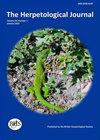黄斑小蝌蚪和华丽小蝌蚪(无尾目:蟾科)不能识别兄弟姐妹
IF 0.6
4区 生物学
Q3 ZOOLOGY
引用次数: 0
摘要
如果群体是由亲属而不是非亲属组成的,那么群体中动物的利益可能会更大,因为与亲属合作会增加其自身基因传递给群体后代的可能性(包容性适合度)。非社会聚集是根据环境特征形成的,而社会聚集是由个体之间的吸引力形成的。个体之间的吸引或排斥是由识别机制介导的,这些机制介导重要的生态过程和行为。在这里,我们进行了实验室实验,以测试两种有症状的蟾蜍Rhinella icterica和R.ornata的蝌蚪是否能够识别兄弟姐妹。我们在野外收集了这两个物种的卵子,并根据三种不同的方法在实验室环境中饲养:兄弟姐妹和非兄弟姐妹在单独的容器中饲养;在用塑料网隔开的同一容器中饲养的兄弟姐妹和非兄弟姐妹;来自同一卵的卵分别饲养,每一个都放在一个单独的容器中。后来,我们测试了蝌蚪是否可以在兄弟姐妹组和非兄弟姐妹组之间进行选择。结果表明,无论饲养方法如何,这两个物种的蝌蚪都无法区分兄弟姐妹和非兄弟姐妹。因此,在这些物种的蝌蚪聚集行为中,亲缘关系不如环境因素重要,它可能取决于成本和收益之间的平衡。我们的研究结果可以作为更好地了解这些物种蝌蚪聚集行为和识别机制的起点。本文章由计算机程序翻译,如有差异,请以英文原文为准。
Rhinella icterica and Rhinella ornata (Anura: Bufonidae) tadpoles do not recognise siblings
Benefits conferred to animals living in groups may be greater if groups are formed by relatives rather than non-relatives, because cooperating with relatives increases the probability of their own genes being passed on to group offspring (inclusive fitness). Non-social aggregations are formed in response to environmental characteristics, while social aggregations are
formed from the attraction among individuals. The attraction or repulsion between individuals is mediated by recognition mechanisms, which mediate important ecological processes and behaviours. Here, we conducted laboratory experiments to test if tadpoles of two sympatric bufonids, Rhinella icterica and R. ornata, are able to recognise siblings. We collected eggs of the two species in the field and raised them in laboratory settings, according to three different methods: siblings and non-siblings reared in separated containers; siblings and non-siblings reared in the same container separated by a plastic net; and eggs from the same spawn reared separately, each one in an individual container. Later, we tested if tadpoles could choose between groups of siblings and non-siblings. The results indicate that tadpoles of neither species were able to discriminate between siblings and non-siblings, regardless of the rearing methods. Therefore, kinship is less important than environmental factors in tadpole aggregation behaviour of these species, and it may be dependent on the balance between costs and benefits. Our results can be used as a start point to better understand tadpole aggregation behaviour and recognition mechanisms in these species.
求助全文
通过发布文献求助,成功后即可免费获取论文全文。
去求助
来源期刊

Herpetological Journal
生物-动物学
CiteScore
2.40
自引率
10.00%
发文量
25
审稿时长
>12 weeks
期刊介绍:
The Herpetological Journal is the Society''s prestigious quarterly scientific journal.
 求助内容:
求助内容: 应助结果提醒方式:
应助结果提醒方式:


